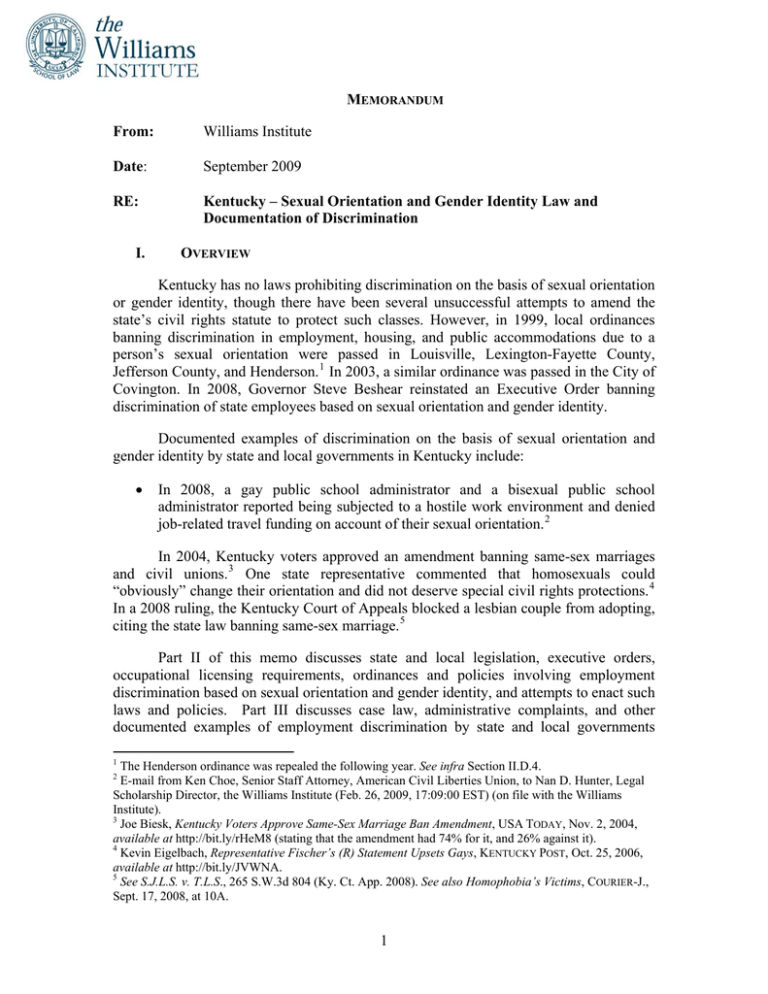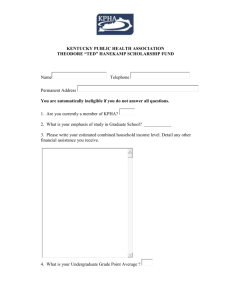
MEMORANDUM
From:
Williams Institute
Date:
September 2009
RE:
Kentucky – Sexual Orientation and Gender Identity Law and
Documentation of Discrimination
I.
OVERVIEW
Kentucky has no laws prohibiting discrimination on the basis of sexual orientation
or gender identity, though there have been several unsuccessful attempts to amend the
state’s civil rights statute to protect such classes. However, in 1999, local ordinances
banning discrimination in employment, housing, and public accommodations due to a
person’s sexual orientation were passed in Louisville, Lexington-Fayette County,
Jefferson County, and Henderson. 1 In 2003, a similar ordinance was passed in the City of
Covington. In 2008, Governor Steve Beshear reinstated an Executive Order banning
discrimination of state employees based on sexual orientation and gender identity.
Documented examples of discrimination on the basis of sexual orientation and
gender identity by state and local governments in Kentucky include:
•
In 2008, a gay public school administrator and a bisexual public school
administrator reported being subjected to a hostile work environment and denied
job-related travel funding on account of their sexual orientation. 2
In 2004, Kentucky voters approved an amendment banning same-sex marriages
and civil unions. 3 One state representative commented that homosexuals could
“obviously” change their orientation and did not deserve special civil rights protections. 4
In a 2008 ruling, the Kentucky Court of Appeals blocked a lesbian couple from adopting,
citing the state law banning same-sex marriage. 5
Part II of this memo discusses state and local legislation, executive orders,
occupational licensing requirements, ordinances and policies involving employment
discrimination based on sexual orientation and gender identity, and attempts to enact such
laws and policies. Part III discusses case law, administrative complaints, and other
documented examples of employment discrimination by state and local governments
1
The Henderson ordinance was repealed the following year. See infra Section II.D.4.
E-mail from Ken Choe, Senior Staff Attorney, American Civil Liberties Union, to Nan D. Hunter, Legal
Scholarship Director, the Williams Institute (Feb. 26, 2009, 17:09:00 EST) (on file with the Williams
Institute).
3
Joe Biesk, Kentucky Voters Approve Same-Sex Marriage Ban Amendment, USA TODAY, Nov. 2, 2004,
available at http://bit.ly/rHeM8 (stating that the amendment had 74% for it, and 26% against it).
4
Kevin Eigelbach, Representative Fischer’s (R) Statement Upsets Gays, KENTUCKY POST, Oct. 25, 2006,
available at http://bit.ly/JVWNA.
5
See S.J.L.S. v. T.L.S., 265 S.W.3d 804 (Ky. Ct. App. 2008). See also Homophobia’s Victims, COURIER-J.,
Sept. 17, 2008, at 10A.
2
1
KENTUCKY
Williams Institute
Employment Discrimination Report
against LGBT people. Part IV discusses state laws and policies outside the employment
context.
2
KENTUCKY
Williams Institute
Employment Discrimination Report
SEXUAL ORIENTATION & GENDER IDENTITY EMPLOYMENT LAW
II.
A.
State-Wide Employment Statutes
Currently, the state of Kentucky has not enacted laws to protect against
discrimination based on sexual orientation or gender identity. 6
B.
Attempts to Enact State legislation
1.
Proposed Bill to Amend Kentucky’s Civil Rights Statute:
On January 8, 2008, a senate bill was introduced to amend Kentucky’s civil rights
statute to include prohibitions on discrimination because of sexual orientation and gender
identity. The bill sought to prohibit such discrimination in various arenas including
employment, housing, public accomodation, and credit transactions. However, the bill
died in committee with no hearings when the legislature adjourned April 15, 2008. See
Senate Bill 55.
On January 10, 2008, the same legislation was introduced via a house bill, but
similarly died in committee with no hearings when the legislature adjourned April 15,
2008. See House Bill 274.
C.
Executive Orders, State Government Personnel Regulations &
Attorney General Opinions
1.
Executive Orders
Kentucky has an interesting history underlying recent Executive Orders
addressing discrimination on the basis of sexual orientation and gender identity. It is in
this arena that the political tug-of-war is most apparent, beginning with Democratic
governor Paul Patton signing an executive order on May 28, 2003 aimed at protecting
gay and transgender state employees from discrimination. The 2003 executive order was
viewed as a sign of changing attitudes in the South. 7
On Diversity day in 2006, former Governor Patton’s order was rescinded by then
Governor Ernie Fletcher by removing language from the Kentucky Affirmative Action
Plan specifically prohibiting discrimination on the basis of sexual orientation and gender
identity. Defending his action, Governor Fletcher’s administration cited several reasons.
One was that removing sexual orientation and gender identity categories as protected
classes would further increase the number of women and blacks working in state
government. Another reason was that the previous affirmative action plan had left the
6
See KY. REV. STAT. ANN. § 344.010 et seq. (2008).
See Christopher Lisotta, Kentucky Tug-of-War: A Series of Pro-Gay Decisions in the Bluegrass State
Bodes Well for Gay and Lesbian Employees and Brings on the Usual Backlash, ADVOCATE, July 8, 2003,
available at http://bit.ly/XnUoE (asking the question: “Is Kentucky becoming a model for pro-gay change
in the South?”) (last visited Sept. 6, 2009).
7
3
KENTUCKY
Williams Institute
Employment Discrimination Report
state open to potential lawsuits since it would force state government to provide separate
bathrooms and other facilities for transsexuals.8
In June 2008, Democratic Governor Steve Beshear reinstated a ban on
discriminating on the basis of sexual orientation or gender identity. The executive order
bars state officials from hiring or firing based on sexual orientation or gender identity. In
a statement describing the motivations behind the reinstatement, Governor Beshear said,
“Experience, qualifications, talent and performance are what matter.” 9
D.
Local Legislation
In 1999, local ordinances banning discrimination in employment, housing, and
public accommodations due to a person’s sexual orientation were passed in Louisville,
Lexington-Fayette County, Jefferson County, and Henderson. In 2003, a similar
ordinance was passed in the City of Covington. Each locality is discussed in further detail
below.
1.
Jefferson County
On October 12, 1999, Jefferson County amended its code of ordinances to
prohibit discrimination on the basis of sexual orientation or gender identity in connection
with employment, housing, and public accomodation.10 Jefferson County is the most
populous county in Kentucky, made up of approximately one hundred cities and towns. 11
“Sexual orientation” is defined as “an individual’s actual or imputed heterosexuality,
homosexuality or bisexuality.” “Gender identity” is defined as “manifesting an identity
not traditionally associated with one’s biological maleness or femaleness.” 12
The ordinance allows for an exemption from the prohibition of discrimination on
the basis of sexual orientation or gender identity for religious institutions or charitable
and educational organizations “operated, supervised, or controlled by a religious
corporation, association, or society.” 13
Complaints of such discrimination are reviewed and decided by the
Louisville/Jefferson County Human Relations Commission. 14
8
Joe Biesk, Gay Rights Supporters Criticize Ky. Governor on Affirmative Action, AP STATE & LOCAL
WIRE, Apr. 11, 2006.
9
The Equality Party, Kentucky Governor Bans Discrimination for Sexual Orientation/Gender Identity,
June 3, 2008, available at http://bit.ly/33g1Xo (last visited Dec. 4, 2008).
10
See Louisville-Jefferson County Metro Government Code Ordinance §§ 92.01-.25 (2008); Louisville
Bound by Ordinance Prohibiting Sexual Orientation Discrimination, 11 KENTUCKY EMPLOYMENT LAW
LETTER 4 (Sept. 2001).
11
In 2003, Jefferson County merged with the City of Louisville to form Louisville-Jefferson County Metro
Government, so it shares the same laws as the City of Louisville, discussed further below.
12
Louisville-Jefferson County Metro Government Code Ordinance § 92.02.
13
Id. § 92.07(B).
14
Id. § 92.08.
4
KENTUCKY
Williams Institute
Employment Discrimination Report
2.
City of Louisville
After similar measures had failed in 1992, 1995, and 1997, on January 26, 1999, a
City of Louisville ordinance aimed at prohibiting employment discrimination on the basis
of sexual orientation and gender identity was enacted. 15 “Sexual orientation” is defined as
“an individual’s actual or imputed heterosexuality, homosexuality, or bisexuality.”
“Gender identity” is defined as: “(1) having a gender identity as a result of a sex change
surgery; or (2) manifesting, for reasons other than dress, an identity not traditionally
associated with one’s biological maleness or femaleness.” 16 While the City of
Louisville’s original ordinance barred only discrimination in employment, because it fell
within Jefferson County, discrimination in employment, housing, and public
accomodation also became barred. 17 Today, the City of Louisville’s civil rights ordinance
prohibits discrimination in housing, employment, and public accommodation on the basis
of “race, sex, religion, disability, age, color, sexual orientation, gender identity, and
national origin.” 18
One of the Louisville Aldermen to vote in favor of the Louisville civil rights
ordinance, Steve Magre, had previously voted against the proposal in three earlier
versions. He reportedly changed his mind after hearing “personal testimonials . . . about
employment discrimination faced by Louisvillians.” 19
The ordinance allowed for an exemption from the prohibition of discrimination on
the basis of sexual orientation or gender identity for religious institutions or charitable
and educational organizations “operated, supervised, or controlled by a religious
corporation, association, or society.” 20 Further, the ordinance provided that employers
could enforce an employee dress policy and designate appropriate gender-specific
bathroom facilities. Also, the ordinance did not prohibit employers from hiring an
employee on the basis of sexual orientation or gender identity if one of those factors was
a bona fide occupational qualification that was reasonably necessary to conduct normal
business operations. 21
Complaints of discrimination in Louisville in violation of the ordinance are
reviewed and decided by the Louisville/Jefferson County Human Relations Commission.
15
See Anti-bias Ordinances Fuel Debate, AP STATE & LOCAL WIRE, Oct. 19, 1999.
Fairness Amendment Added to Louisville’s Codes, 9 KENTUCKY EMPLOYMENT LAW LETTER 6 (March
1999) [hereinafter MARCH KENTUCKY EMPLOYMENT LAW LETTER]. But see Louisville-Jefferson County
Metro Government Code Ordinance § 92.02. The City of Louisville, after its merger with Jefferson County
in 2003, is now governed by the code of ordinances for Louisville-Jefferson County Metro Government.
17
Rogers v. Fiscal Court of Jefferson Louisville, 48 S.W.3d 28 (Ct. App. Ky. 2001) (finding that Jefferson
County’s more expansive protections against discrimination on the basis of sexual orientation and gender
identity applied to the City of Louisville).
18
LOUISVILLE ORD. 193 (2004).
19
Louisville, KY Gets Fairness Law with Some TG Protection, GENDER NEWS, Jan. 26, 1999,
http://bit.ly/wYSO6.
20
See MARCH KENTUCKY EMPLOYMENT LAW LETTER, supra note 18.
21
See id.
16
5
KENTUCKY
Williams Institute
Employment Discrimination Report
The Commission enforces the civil rights legislation and also enforces hate crime
legislation. 22
3.
Lexington-Fayette County
On July 18, 1999, Lexington-Fayette County approved an ordinance prohibiting
discrimination in employment, housing, and public accommodations on the basis of
sexual orientation and gender identity. 23 The ordinance adopts several provisions found
in the Kentucky Civil Rights Act, treating sexual orientation and gender identity like any
other category protected under the Act. 24 “Sexual orientation” is defined as “an
individual’s actual or imputed heterosexuality, homosexuality, or bisexuality.” “Gender
identity” is defined as “(a) having a gender identity as a result of a sex change surgery; or
(b) manifesting, for reasons other than dress, an identity not traditionally associated with
one’s biological maleness or femaleness.” 25
Before the Lexington-Fayette ordinance was passed, the city held public hearings
and heard testimony from both supporters and opponents of the measure. One supporter
of the ordinance testified that after years of positive reviews and promotions in her
employment, her supervisor began criticizing her work and gave her a negative review
after discovering she was a lesbian. She testified that “in about four weeks, I went from
being an outstanding employee to a horrible one, just because my supervisor believed I
was a lesbian.” 26 After hearing the testimony and before voting in favor of the measure,
Councilwoman Gloria Martin described harsh and disturbing telephone calls and letters
that she had received from opponents of the ordinance, saying that “[t]hese
correspondences truly opened my eyes and confirmed, unfortunately, why we need to
have this ordinance.” 27
The ordinance allows for an exemption from the prohibition of discrimination on
the basis of sexual orientation or gender identity for religious institutions or charitable
and educational organizations “operated, supervised, or controlled by a religious
corporation, association, or society.” 28 But if the institution or organization receives “a
majority of its annual funding from any federal, state, local or other government body or
agency,” then it is not entitled to the exception and is accordingly prohibited from
discrimination on the basis of sexual orientation or gender identity. 29 Further, the
22
Louisville Hum. Rel. Comm’n, http://www.louisvilleky.gov/HumanRelations/ (last visited Dec. 4, 2008).
See LEXINGTON-FAYETTE COUNTY ORD. § 2-33; Lexington Adopts ‘Fairness Ordinance,’ 9 KENTUCKY
EMPLOYMENT LAW LETTER 11 (Aug. 1999) [hereinafter AUGUST KENTUCKY EMPLOYMENT LAW LETTER].
24
The provisions of the Kentucky Civil Rights Act that the Lexington-Fayette County Local Ordinance
adopt are KY. REV. STAT. ANN. 344.010(1), (5) ̶ (13) and (16), 344.030 ( 2) ̶(5), 344.040, 344.045, 344.050,
344.060, 344.070, 344.080, 344.100, 344.110, 344.120, 344.130, 344.140, 344.145, 344.360(1) ̶ (8),
344.365(1) ̶ (4), 344.367, 344.370(1), (2), (4), 344.375, 344.380, 344.400, 344.680 (1998).
25
LEXINGTON-FAYETTE COUNTY ORD. § 2.33(4), (5).
26
Videocassettes, Lexington-Fayette Council Meetings (on file with Dean Forster, Northern Kentucky
Fairness Alliance).
27
Id.
28
Id. at § 2-33(7).
29
Id.
23
6
KENTUCKY
Williams Institute
Employment Discrimination Report
ordinance provided that employers could enforce an employee dress policy and designate
appropriate gender-specific bathroom facilities. 30
Complaints of discrimination in Lexington-Fayette County in violation of the
ordinance are reviewed and decided by the Lexington-Fayette Urban County Human
Rights Commission. 31 According to a recent report released by the Kentucky Advisory
Committee to the United States Commission on Civil Rights, the Commission
investigates about 300 complaints a year, 85 percent of which involve employment
issues. 32 Of those employment discrimination complaints, however, the majority of the
allegations are based on race and no information was provided as to how many
complaints involved discrimination based on sexual orientation or gender identity. 33
4.
City of Henderson
On October 5, 1999, the City of Henderson amended its ordinances to prohibit
discrimination in employment, housing, and public accommodation on the basis of sexual
orientation. The ordinance passed in spite of a strong showing of opponents that appeared
at public hearings. 34 One opponent told city commissioners that anyone voting for the
ordinance should be thrown into the Ohio River with “a rope tied around your neck with
a rock at the other end.” 35
Two years later, the ordinance was repealed. Opponents believed that
Henderson’s adoption of such an ordinance was a legitimatization of an “immoral
lifestyle.” 36 Defending his vote to repeal the ordinance, Commissioner Robby Mills
stated, “I believe this is a moral course of action and this is what the public would have
us do.” 37
5.
City of Covington
On April 29, 2003, the City of Covington Commission voted unanimously to
enact new protections against discrimination in employment, housing, and public
accommodation on the basis of sexual orientation and gender identity.38 The Covington
Human Rights Commission decided to add the categories to the city’s human rights
ordinance after receiving two complaints since its formation in July 1998. 39 One
commission member, Charles D. King, who was also a member of the Northern
30
Id. at § 2-33(6).
Id. at §§ 199-94, 201-99.
32
KY. ADVISORY COMM. TO THE U.S. COMM’N ON CIVIL RIGHTS, FAIR HOUSING ENFORCEMENT IN
KENTUCKY (2008), available at http://www.usccr.gov/pubs/KYFairHous.pdf.
33
Lexington-Fayette Urban County Human Rights Commission, About the Commission,
http://www.lfuchrc.org/.
34
A thousand people attended two public hearings held in Henderson in September 1999. Anti-bias
Ordinances Fuel Debate, AP STATE & LOCAL WIRE, Oct. 19, 1999.
35
Id.
36
Fairness Ordinance Expected to Be Repealed in Henderson, AP STATE & LOCAL WIRE, Nov. 10, 2000.
37
Anti-discrimination Repeal May Pass, LEXINGTON HERALD-LEADER (Kentucky), Feb. 15, 2001, at B3.
38
See COVINGTON CODE ORD. § 37.01 et seq.; Cindy Schroeder, Gays Win Expanded Rights Coverage,
CINCINNATI ENQ., Apr. 30, 2003, at 1A.
39
City to Consider Gay Rights Ordinance, AP STATE & LOCAL WIRE, Dec. 16, 2002.
31
7
KENTUCKY
Williams Institute
Employment Discrimination Report
Kentucky Fairness Alliance, stated that he received various phone calls from gay people
who had had their houses vandalized or who suffered confrontations while having no
protections. 40
Community Values (“CVC”), a conservative activist organization, started a mail
campaign targeting the ordinance as a step toward “normalizing” homosexual behavior. 41
The CVC, known for its crusade against “adult” businesses, sent to approximately 75
percent of all Covington homes a 24-page booklet by the Washington-based Family
Research Council about “the destructive homosexual lifestyle” that “has serious
emotional and physical dangers associated with it.” 42 The mailings, however, appeared
to backfire as Covington residents expressed support for the law during two public
hearings and the Commission voting to pass the ordinance in spite of CVC’s aggressive
campaign. 43
During public hearings held before passage of the Covington ordinance, there was
testimony from Covington residents who had experienced discrimination based on their
sexual orientation. One man described how his home had been vandalized and that when
he called the police, “I had to suffer through verbal harassment from the cop that
responded. That only happened once, because I never reported it again. And I’ve had the
vandalism several times.” 44
“Sexual orientation” is defined as “an individual’s actual or imputed
heterosexuality, homosexuality, or bisexuality.” “Gender identity” is defined as
“manifesting an identity not traditionally associated with one’s biological maleness or
femaleness.” 45 The ordinance allows for an exemption from the prohibition of
discrimination on the basis of sexual orientation or gender identity for religious
institutions or charitable and educational organizations “operated, supervised, or
controlled by a religious corporation, association, or society.” 46
A year after the ordinance took effect on May 10, 2003, city officials reported that
the Commission had received no complaints about discrimination based on sexual
orientation or any other factor. 47
E.
Occupational Licensing Requirements:
There are several state licensing requirements that reference “moral turpitude” or
similar allusions that could include sexual orientation or gender identity. Additionally,
40
Id.
Cindy Schroeder, Letters Target Gay Ordinance: CCV Mailing Critical of Anti-bias Legislation,
CINCINNATI ENQUIRER, Apr. 17, 2003.
42
Id.; Stephanie Simon, Campaign Targets City’s Gay-rights Vote, LA TIMES, Apr. 29, 2003, at A16.
43
Simon, supra note 42.
44
Videocassettes, Covington Civil Rights Public Hearings (on file with Dean Forster, Northern Kentucky
Fairness Alliance).
45
COVINGTON CODE ORD. § 37.02.
46
Id. at § 37.09(B).
47
Mike Rutledge, Covington Stands Alone for Gay Rights, COVINGTON ONLINE, May 1, 2004,
http://www.covingtonky.com/index.asp?fn=news&id=989.
41
8
KENTUCKY
Williams Institute
Employment Discrimination Report
the Kentucky Revised Statutes provides a blanket provision applying to all occupations
for which there is a license, stating that a person “may be denied a license on the grounds
that he does not possess good moral character.” 48 After checking all occupations for
which the state issues a license, 49 the occupational boards with such licensing
requirements are listed below with the relevant language. A non-exhaustive search of
cases, news articles and websites did not uncover any information concerning specific
examples of the occupational licensing standards being applied to LGBT applicants.
Education Professional Standards Board: An education professional “shall
exemplify behaviors which maintain the dignity and integrity of the profession.” 50
Kentucky Board of Licensure for Private Investigators: A private investigator
must (1) “possess good moral character,” (2) “be of good moral character,” and
(3) “adhere to the highest moral principles of the profession.” 51
Fee-Based Pastoral Counselors: A pastoral counselor “shall maintain standards of
professional competence and integrity and shall be subject to disciplinary action
upon conviction of a felony or misdemeanor involving moral turpitude.” 52
Board of Nursing Home Administrators: Nursing home administrators must
provide “proof satisfactory to the board that he is of good moral character and is
otherwise suitable.” 53
Board of Occupational Therapy: Licensees “shall file a written application on a
form provided by the Board, showing to the satisfaction of the Board that the
person is of good moral character.” Further, licensees “must inform the Board of
any misdemeanor or civil violation involving an offense of moral turpitude in any
state in last five years.” Finally, licensees “shall not engage in acts of sexual
misconduct with recipients of their services or in their presence.” 54
48
KY. REV. STAT. § 335B.040 (2008).
The Kentucky occupational boards that issue licenses are Kentucky Real Estate Comm’n, Kentucky State
Bd. of Accountancy, Ed. Prof’l Standards Bd., Kentucky Bd. of Licensure for Private Investigators,
Kentucky Bar Assoc., Athletic Trainers, Kentucky Chiropractors, Kentucky Bd. of Dentistry, Kentucky
Bd.of Respiratory Care, Div. of Reg. Child Care, Kentucky Bd. of Med. Licensure, Kentucky Bd. of
Nursing, Kentucky Bd. of Pharmacy, Bd. of Physical Therapy, Alcohol & Drug Counselors Bd., Dietitians
& Nutritionists, Fee-Based Pastoral Counselors, Interpreters for the Deaf & Hard of Hearing, Marriage &
Family Therapists, Bd. of Licensure for Massage Therapy, Bd. of Nursing Home Admin., and Bd. of
Occupational Therapy.
50
Regulations available at http://www.kyepsb.net/certification/certregs.asp (last visited Dec. 4, 2008).
51
Regulations available at http://finance.ky.gov/ourcabinet/caboff/OAS/op/privinve/ (last visited Dec. 4,
2008).
49
53
Regulations available at http://finance.ky.gov/ourcabinet/caboff/OAS/op/nurhomadm/ (last visited Dec.
4, 2008).
54
Regulations available at http://finance.ky.gov/ourcabinet/caboff/OAS/op/occupth/ (last visited Dec. 4,
2008).
9
KENTUCKY
Williams Institute
Employment Discrimination Report
III.
DOCUMENTED EXAMPLES OF EMPLOYMENT DISCRIMINATION AGAINST
LGBT PEOPLE BY STATE & LOCAL GOVERNMENTS
A.
Case Law
None.
B.
Administrative Complaints
The Kentucky State Personnel Board oversees issues relating to state employees.
The Office of Diversity and Equality monitors state compliance with equal opportunity
policies and the state’s affirmative action program. The policies and the affirmative
action program aim to provide equal employment opportunity without discrimination on
the basis of race, color, religion, sex, national origin, sexual orientation and gender
identity, ancestry, age, disability or veteran status.
When a state employee feels there has been unjust treatment, the employee may
file a formal grievance with his or her agency. If a grievance is filed that alleges
discrimination on the basis of one of the protected classes like sexual orientation or
gender identity, the recipient of the grievance is required to immediately report to an
Equal Employment Opportunity Coordinator to apply the state’s affirmative action
plan. 55 The complaints are not available on electronic sources, but the actual filed
grievance forms may be inspected or obtained at the Personnel Board office in
Kentucky. 56
C.
Other Documented Examples of Discrimination
Kentucky Public School
In 2008, a gay public school administrator and a bisexual public school
administrator reported being subjected to a hostile work environment and denied jobrelated travel funding on account of their sexual orientations. 57
55
Ky. Pers. Cabinet, Office of Diversity & Equality, Complaints & Grievance,
http://personnel.ky.gov/diversity/eeo/grievance.htm (last visited Sept. 6, 2009).
56
Pers. Bd., 28 Fountain Place, Frankfort, KY 40601.
57
E-mail from Ken Choe, Senior Staff Attorney, American Civil Liberties Union, to Nan D. Hunter, Legal
Scholarship Director, the Williams Institute (Feb. 26, 2009, 17:09:00 EST) (on file with the Williams
Institute).
10
KENTUCKY
Williams Institute
Employment Discrimination Report
IV.
NON-EMPLOYMENT SEXUAL ORIENTATION & GENDER IDENTITY RELATED
LAW
In addition to state employment law, the following areas of state law were
searched for other examples of employment-related discrimination against LGBT people
by state and local governments and indicia of animus against LGBT people by the state
government, state officials, and employees. As such, this section is not intended to be a
comprehensive overview of sexual orientation and gender identity law in these areas.
A.
Criminalization of Same-Sex Sexual Behavior
The Kentucky sodomy law was struck down in 1992 by the state Supreme Court
case Commonwealth v. Wasson. 58 Under the sodomy statute, it did not matter if the act
was done in privacy. The Court found the law to violate privacy and equal protection
rights.
In 1996, an attempt to recriminalize sodomy was made, but was unsuccessful.
Floor Amendment 1 to House Bill 219 would have created a right of the General
Assembly to define and punish sodomy, including between consenting parties. It was
introduced in 1996, but died in committee. 59
B.
Housing & Public Accommodations Discrimination
Lexington-Fayette County, Jefferson County, the City of Louisville, and the City
of Covington all have ordinances prohibiting discrimination in housing and public
accomodations on the basis of sexual orientation and gender identity. 60
Kentucky Housing Corporation, the state housing finance agency, provides
housing opportunities for low- and moderate-income Kentuckians, and prohibits
discrimination based on “race, color, religion, sex, national origin, sexual orientation and
gender identity, ancestry, age, disability or veteran status.” 61
As discussed above, complaints by state employees of sexual orientation or
gender identity discrimination in violation of the States Affirmative Action program are
initially filed with the state Personnel Board. 62 Complaints based on legislation enacted
by municipalities protecting such classes are filed with the respective municipal Human
58
842 S.W.2d 487 (Ky. 1992).
See NAT’L GAY & LESBIAN TASK FORCE, ACTIVIST ALERT, Mar. 1996, http://bit.ly/JkjOZ (last visited
Sept. 6, 2009).
60
See supra Section II.D.
61
Compare KY. REV. STAT. ANN. § 344.010 et seq. with Kentucky Housing Corp., Kentucky Recognizes
Fair Housing Month, Apr. 25, 2006, http://www.kyhousing.org/full.asp?id=563 (last visited Sept. 6, 2009).
62
See supra Section III.B (discussing the Personnel Board’s enforcement of the State’s Affirmative Action
Program). The Kentucky Human Rights Commission receives complaints about violations of the state civil
rights statute, which currently does not include sexual orientation and gender identity as protected classes.
59
11
KENTUCKY
Williams Institute
Employment Discrimination Report
Rights Commissions. 63 No information was located about complaints filed with other
state entities.
C.
HIV/AIDS
According
to KRS § 304.12-013, sexual orientation may not be used in the
underwriting process or as a determining factor as to whether an insurance applicant
should be tested for HIV. 64
A defeated bill would have prohibited a person with HIV in Kentucky from being
licensed as a cosmetologist. 65
Another defeated bill would have required public school teachers to teach that
“homosexual sodomy” is the primary method of contracting HIV. 66
D.
Hate Crimes
According to KRS § 164.9485, colleges and universities must report to the police
any hate crime based on sexual orientation, among other protected classes, that occurs on
campus.
E.
Rights of Same-Sex Couples
In 2004, Kentucky voters approved a state constitutional amendment banning
same-sex marriages and civil unions. 67 Section 233A of the Kentucky Constitution states
that, “Only a marriage between one man and one woman shall be valid or recognized as a
marriage in Kentucky. A legal status identical or substantially similar to that of marriage
for unmarried individuals shall not be valid or recognized.” 68 Marriage is “prohibited and
void” by statute in Kentucky if between members of the same sex 69 and “against
Kentucky public policy.” 70
The same-sex marriage ban amendment has been used as a basis for taking from
gay couples the right to adopt children. In S.J.L.S. v. T.L.S., a lesbian couple’s adoption
request was rejected. One of the two women decided to be artificially inseminated and
had a child. After the couple split, the partner initiated adoption proceedings as a
stepparent. The Kentucky Court of Appeals held that stepparent adoptions are allowed
only when the stepparent is married to the biological mother or father of the child, and
63
See supra Section II.D (discussing local ordinances prohibiting discrimination on the basis of sexual
orientation and gender identity).
64
KY. REV. STAT. ANN. § 304.12-013(5)(c) (2008).
65
See QUEER RESOURCES DIRECTORY, ANTI-GAY MEASURES DEFEATED, Mar. 29, 1996,
http://www.qrd.org/qrd/usa/kentucky/1996.
66
See id.
67
Joe Biesk, Kentucky Voters Approve Same-Sex Marriage Ban Amendment, USA TODAY, Nov. 2, 2004,
available at http://bit.ly/rHeM8 (stating that the amendment had 74% for it, and 26% against it).
68
KY. CONST. § 233a (2008). See also KY. REV. STAT. ANN. § 402.005 (2008) (defining marriage).
69
KY. REV. STAT. ANN. § 402.020 (2008).
70
§ 402.040(2).
12
KENTUCKY
Williams Institute
Employment Discrimination Report
since Kentucky banned same-sex marriage, the lesbian “stepparent” could not adopt the
child.
In 2006, the University of Louisville Board of Trustees voted to cover domestic
partners in its employee health benefits, with the University of Kentucky following suit
the year after. In 2007, Senate Bill 152 and House Bill 110 were introduced, seeking to
ban benefits for domestic partners. Both were defeated in committee, with no hearing
transcripts available. Once again, several representatives pushed to introduce virtually
the same bill in 2008 through Senate Bill 112 and House Bill 118. The Senate approved
the bill 30-5, motivated by arguments that the legislation was necessary to protect the
Constitutional amendment that bans same-sex marriage in Kentucky. 71 But the House
committee killed the bill 9-6. 72 Senator Vernie McGaha (R) vowed to reintroduce the bill
in 2009, motivated once again by Kentucky’s constitutional amendment banning samesex marriage. 73
In Ireland v. Davis, the Kentucky Court of Appeals reversed the Fayette Circuit
and District Courts’ dismissal of a domestic violence order entered for a gay man against
his partner because the domestic violence statute did not extend protection to same-sex
couples. The Court of Appeals found that such an interpretation of the domestic violence
statute would be contrary to the purpose of the statute, and noted that excluding same-sex
couples from protection under the statute would deny them equal protection of the law.
The Court reversed the dismissal without addressing the constitutional argument
further. 74
In 2008, a bill was introduced in the Kentucky House and Senate to prohibit
public agencies from providing health benefits to domestic partners of state employees. 75
While the Senate passed the bill, it did not get out of committee in the House.
71
Senate Passes Domestic Partner Benefit Ban, POL WATCHERS, Jan. 30, 2008,
http://polwatchers.typepad.com/pol_watchers/2008/01/senate-passes-d.html, http://bit.ly/gGA8W.
72
Sarah Vos, Partner Benefits Bill Killed, LEXINGTON HER. LEADER (Ky.), Mar. 21, 2008, at B1.
73
Id.
74
See Ireland v. Davis, 957 S.W.2d 310 (Ky. Ct. App. 1997).
75
See Kentucky Fairness Alliance, Background Information, Hold the Line on Healthcare Discrimination
Campaign, Mar. 24, 2008, http://bit.ly/eIozD (last visited Sept. 6, 2009).
13







